#hilda librarian
Text

the picture of the 90s mother helping her kids beat a level in super mario land
#hilda netflix#hilda the series#hilda fanart#johanna hilda#frida hilda#david hilda#kaisa hilda#hilda librarian#my art
2K notes
·
View notes
Text
Promise I'm working on all the other Hilda ideas I just posted, but this came to me and I had to do something with it before I forgot
So
(Super light Hilda season 3 spoiler)
Throwback to @blaithnne saying "Sketchbook fake dating AU," because I have a new proposal for how it goes it since we know who Hilda's dad is now;
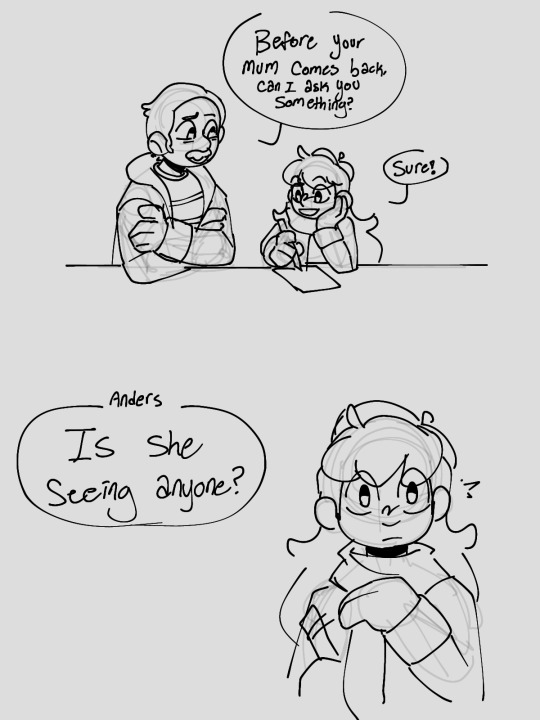





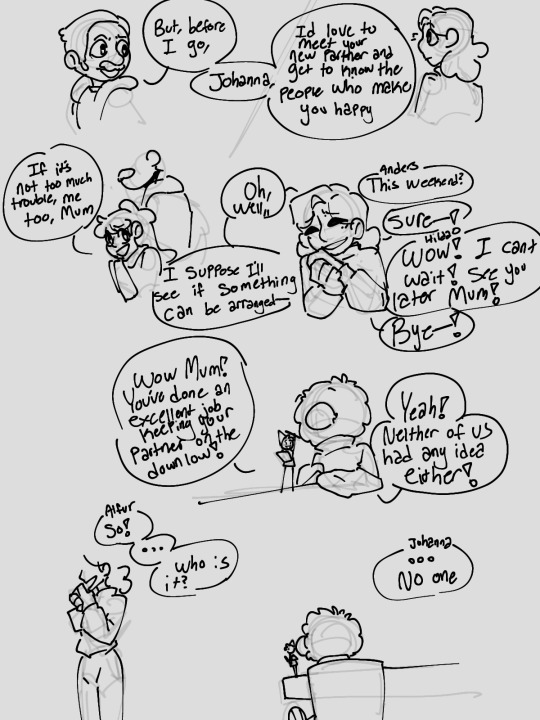

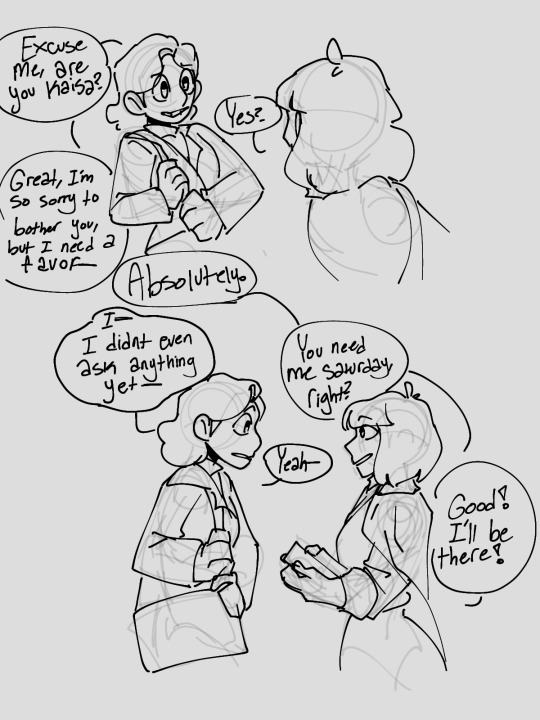

(She really wants out of board game night)
Also pardon the ever changing style, I literally worked on this like, all day and I started getting really exhausted in those last few pages
|| Next
#art#digital art#hilda netflix#hilda the series#hilda#hilda sketchbook#hilda johanna#johanna hilda#kaisa hilda#hilda kaisa#kaisa the librarian#hilda librarian#anders hilda#hilda anders
465 notes
·
View notes
Text

#hilda#hilda netflix#hilda the series#hilda kaisa#hilda johanna#hilda librarian#sketchbook#sketchbook ship#kaisa hilda#johanna x librarian#kaisanna#sketchbook ship hilda
235 notes
·
View notes
Text

the only thing i can post today is this drawing of @phopollo 's green-haired teenage kaisa i think she's such an awkward little freak (<3)
#it is 730am and she has had 4 hours of sleep#hilda netflix#kaisa#hilda kaisa#hilda librarian#hilda fanart#my art#hilda the series
105 notes
·
View notes
Text

Lauren maybe giving Kaisa grey hairs early, Kaisa is just as capable giving it back :3
Got the idea from @blaithnne
#kiki draws#hilda#hilda the show#hilda the series#netflix hilda#hilda netflix#hilda lauren#hilda librarian#Lauren hilda#hilda johanna#johanna hilda#kaisa hilda#hilda kaisa#hilda the librarian#sketchbook ship hilda#sketchbook ship#incorrect quotes#incorrect hilda quotes#kaisanna
92 notes
·
View notes
Text
I never Give my Girl Kaisa enough love.
I love Kaisa in this outfit so much .

#hilda series#hilda (netflix)#hilda (hilda)#hilda#kaisa hilda#hilda netflix#hilda kaisa#hilda librarian
29 notes
·
View notes
Text
Kaisa's defense: Are patrons who borrow books, liable to return them?

Kaisa gets annoyed with the committee of Three Witches
Happy Book Lovers' Day! On December 16, 2020, I submitted a post to I Love Libraries about Kaisa, the recurring librarian in the animated series, Hilda, titled "Witches, patrons, and the value of libraries in Netflix's Hilda," and included a section, where Kaisa argues that the "person who borrowed the book is liable for its return," with the obligation passed from the librarian to the patron, while the witches say SHE is the one responsible. While this was included in the final article, which was published on January 8, 2021, and re-titled "The Mysterious Librarian in Netflix's "Hilda" Finally Gets a Name," it was worded differently, [1] and I didn't explore it in-depth. So I'll re-examine that part of the episode and note its implications more broadly in terms of relations between librarians and patrons, and the ever-present problem of missing books from libraries.
This post is reprinted from Pop Culture Library Review and Wayback Machine.
In the episode "Chapter 3: The Witch," Kaisa comes before three witches who govern the tower and they tell her that she must return a book missing from the library for almost 30 years! She challenges this, saying that the person who borrowed the book is liable for its return, passing off the obligation from the librarian to the patron. The witches remind her of her responsibilities and say that if she does not find the book, she will be cast into the void! While librarians obviously are not cast into the void for misplaced books, the episode is right to highlight the problem of missing books and how librarians solve this problem. Later, Kaisa reveals why she had not tried to return the book until now: she was embarrassed that she could not use the right spell to find the book. They later return with the book and Tildy pleads with the witches to not punish them, the void of no return is unintentionally opened, trapping Kaisa, Hilda, and Frida.
The question at the title of this post still itches my brain: Are patrons who borrow books, liable to return them? Some on /r/Libraries and /r/librarians have shared that they give students who fail to return a book a warning, the terrible condition of returned books(which is kinda funny to read), stolen/lost book, and lending to the wrong person. Others shared the return of missing items, horrible patrons, weird sense of guilt when checking out books, getting patrons to return their books, presenting photo IDs to check out books, and libraries that give anyone a library card. [2] One of the most interesting discussions was one on /r/asklibrarians where librarians responded as to how a librarian could cover up a theft:
...Books disappear all the time. Depends on if the library uses any security measures like RFID tags...Here are a few ideas: Checking the book out to another user. Marking it as lost under that other users identity. Checking the book in but just taking it. Makes it appear lost in the shelves. Simply taking the book through an employee entrance with no security gates. Or simply desensitizing the security strip and walking the book out the front door. Or you can purge the user from the system making them not exist. Assuming a modern library, the librarian could alter the records if they had the right circulation authorizations. In most cases, there is likely to be an audit trail, but no one is likely to be looking for that unless alerted to the possibility that someone did that. Someone with the right IT privileges for the circulation software, could probably alter those audit trails as well.
In some ways, Kaisa may have done this when not getting the book back from Tildy. She probably as had to deal with those who return books with "illegal drugs, water damage, urine odors, cigarette burns, coffee stains, fecal matter, roaches, or peanut butter globs," those who have tried to argue that they don't need to pay library fines, while dealing with account issues, checking out books, and other tasks. [3] As one librarian put it, not only can the length of a loan period " have a big impact on staff workload and patron satisfaction with a library," but overdue materials are an issue "because they are not available to other library users" while fines lead to the perception that overdue fines allows the library to function and buy materials.
In fact, many libraries spend a lot of money and time "attempting to retrieve overdue materials and collect various fines," meaning these fines represent "a drop in the bucket for library revenues" and saying that while overdue fines may "provide some incentive for returning materials" some studies have shown they are "not a significant deterrent to the ultimate return of items. Libraries can also collect fines on lost and damaged materials or lost library identification cards, which are meant to " replace or repair the material...plus a processing fee," while it was said that there "should be some flexibility with overdue policies." It has also been said that if a book is lost, then a fine should be collected, while for a missing book, "the library does not know where the item is." [4]
The same librarian urged library personnel to be "familiar with registration procedures and be prepared to answer questions about the library’s services and resources," and to have specific "procedures for dealing with security and medical emergencies and all staff should be thoroughly familiar with them." This connects with the mission of a librarian to not only handling books, but books themselves serving a vital function, and the responsibility of the library to "adjust the time allotted for the patron to have the item to ensure it reaches the originating library on time." It was also said that librarians should take into account copyright, freedom of information, privacy, duty of care, censorship, and confidentiality which assisting a patron. [5]
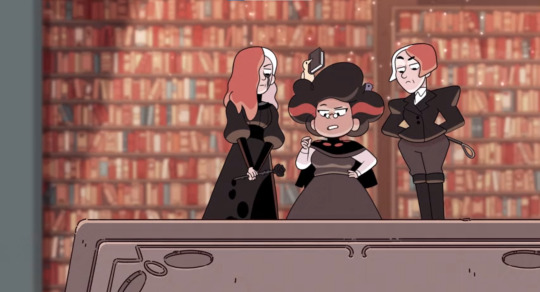
Committee of Witches annoyed with Kaisa
When it comes to actual libraries, there appears to be agreement with the idea that patrons who borrow books are liable to return them. In fact, of library policies I read, there was a consensus that patrons are responsible for book replacement, returning books on time (late books hinder ability of other patrons to use book), have to pay for damaged or lost materials, and responsible for books they have checked out under their name. [6] Some librarians even said that those who abuse privileges may be banned from interlibrary loan, holds placed on their student accounts, suspension of borrowing privileges, or being reported to a collection agency. [7]
There were libraries which laid out their responsibilities even more clearly. Some said they had the "responsibility of ensuring the availability of materials for the use of the community," but that the person who borrows materials is responsible for materials borrowed and "agrees to return them in good condition and by the date they are due." Others absolved the library from "liability, damages, or expense" from misuse of library devices, library materials, and asserted that librarians are responsible for renewing and returning items, with fees imposed if items are not returned. However, in some cases, librarians had the discretion to stop or restrict loans of materials or the ability to waive fines, charges, or fees in cases of hardship. [8]
Kaisa stands by her view that patrons who borrow books are liable to return them, while the witches say it should be the library's responsibility after a book is overdue for 30 years. If this was the real world, the responsibility of the patron would likely still be emphasized, but at that point, the library would have declared the book "lost" and probably charged the patron a fee for the lost book. Kaisa does not do that as she knows exactly who has the book, but she doesn't want to take responsibility for getting the book back, not at first.
The answer to the question, are patrons who borrow books, liable to return them, is generally yes, but that does not justify patrons being treated in such a way that they are heavily penalized with fines which discourage them from borrowing from a library. It is certainly a "wonderful surprise" that Kaisa is the keeper of the books, i.e. the librarian who, with the help of Hilda and Frida, was able to convince an old lady to return a book. An impressive feat, you could say.
© 2022 Burkely Hermann. All rights reserved.
Notes
[1] Worded as "the person who borrowed the book is responsible for it and the witches threaten to cast her into a void if she cannot locate the lost item."
[2] See the "checking out books" (Nov. 2018), "Librarians: What's the worst condition someone has returned a book?" (Apr. 2014), "Most stolen book at your library" (Jul. 2018),"I (accudentally) lent a book to someone who is NOT authorized to use the library. What to do?" (Jun. 2020), "Lots of (probably) missing items were returned!" (Nov. 2020), "Horrible Patrons: CoVid Edition" (Feb. 2021), "I'm struggling with a weird sense of guilt when checking books out now, it's very irrational" (Sept. 2021), "Academic librarians: strategies for getting checked out books back from faculty?" (Mar. 2017), "Violating the spirit of the policy but not the letter of it..." (May 2017), "I think one of our patrons is a hoarder, and he isn't returning our books." (Aug. 2018), "Borrowing Policy Inquiry" (Dec. 2016), "Borrowing Out of Town" (Jun. 2016).
[3] See K.W. Colyard, "How To Piss Off Your Local Librarian," Bustle, Jul. 16, 2015; Oleg Kagan, "Day in the Life: Reference Librarian at a Public Library," Every Library, Nov. 29, 2017.
[4] "Basic library procedures: Circulation functions," Living in the Library World, Dec. 18, 2008; "Basic library procedures: Library inventory," Living in the Library World, Jan. 18, 2009.
[5] See "Circulation of nonbook materials," Living in the Library World, Dec. 28, 2008; "Circulation's role in security," Living in the Library World, Dec. 28, 2008; "Basic library procedures: Processing library materials," Living in the Library World, Jan. 7, 2009; "Library co-operation, interlibrary loan and document delivery," Living in the Library World, Jan. 25, 2010; "Ethics," Living in the Library World, Nov. 22, 2010.
[6] "Library Policies," Galveston College, accessed October 3, 2021; "Loan Periods," Richard E. Bjork Library at Stockton University, accessed October 3, 2021; "Overdue Materials," Richard E. Bjork Library at Stockton University, accessed October 3, 2021; "Lost/Damaged Item," Richard E. Bjork Library at Stockton University, accessed October 3, 2021; "Outside Borrowers," University Libraries of University of Georgia, accessed October 3, 2021; "Circulation Policies," Princeton University Library, accessed October 3, 2021; "Borrow," Pitts Theology Library at Emory University, accessed October 3, 2021;
"Library," Caswell County, NC, accessed October 3, 2021; "Interlibrary Loan Borrowing and Document Delivery Services," University of North Texas University Libraries, accessed October 3, 2021; "Library Fines and Fees," New York Public Library, accessed October 3, 2021; "Library Policies, Guidelines and Procedures: Lost or Damaged Materials," Calvin T. Ryan Library, University of Nebraska Kearney, accessed October 3, 2021; "Step by Step – Billing Patrons and Libraries for Lost Books in Horizon," Clinton-Essex-Franklin Library System, accessed October 3, 2021; "Loan Periods and Fines," Pasadena Public Library, accessed October 3, 2021; "Studio Use Policy," Pikes Peak Library District, Sept. 2019; "Interlibrary Loan (ILL)," SRSU Library & Archives, accessed October 3, 2021;
"Policies," Proctor Library, accessed October 3, 2021; "Borrow Materials," E.H. Butler Library, accessed October 3, 2021; "InterLibrary Loan (ILL)," Osceola Library System, accessed October 3, 2021; "Borrowing/Circulation," SCSU Research Guides at Southern Connecticut State University, accessed October 3, 2021; "Library Policies," Orange Coast College, accessed October 3, 2021; "Borrowing and Renewals," Marriott Library, University of Utah, accessed October 3, 2021; "Borrow," UC Berkeley Library, accessed October 3, 2021; "Borrowing," Hawai'i Pacific University, accessed October 3, 2021; "Fine Free Library," San Francisco Public Library, accessed October 3, 2021; "FAQ : Interlibrary Loan," Smithsonian Libraries, accessed October 3, 2021; "Checkout Periods and Protocols," Fulton Library, Utah Valley University, accessed October 3, 2021 (discussed secondary borrowers); "Borrow, Renew & Return," Georgia Tech Library, accessed October 3, 2021; "Borrowing Policies," Stewart B. Land Library, accessed October 3, 2021; "Borrowing Materials," Memorial Library of Nazereth & Vicinity," accessed October 3, 2021; "Hennepin County Library goes fine-free," Hennepin County Library, Mar. 9, 2021; "Borrow Items," Charleston County Public Library, accessed October 3, 2021;
"Interlibrary Loan," Omaha Public Library, accessed October 3, 2021; "Book Club in a Bag," Southeast Regional Library, accessed October 3, 2021; "Interlibrary Loan," Kenton County Public Library, accessed October 3, 2021; "Pageturners To Go," Multnomah Library, accessed October 3, 2021; "Remote Delivery," UW-Madison Libraries, accessed October 3, 2021; "Library," Thesophical Society of America, accessed October 3, 2021; "Borrowing Privileges," Penn State University Libraries, accessed October 3, 2021; "Borrowing Materials," Circulation Services, Research Guides at Broward College, accessed October 3, 2021; "Prince William libraries are now fine-free," InsideNOVA, Jul. 7, 2021; "Your Library Account," Boulder Public Library, accessed October 3, 2021; "Services - Libraries," LibGuides at St. Joseph's College New York, accessed October 3, 2021;
"Nevada State College Interlibrary Loan," Nevada State College, accessed October 3, 2021; "Get a Library Card," Laurel County Public Library, accessed October 3, 2021; "InterLibrary Loan," Queens College Libraries, accessed October 3, 2021; "Bradley Library eliminates late fees," Daily Journal, Sept. 9, 2021; "Library," Amridge University, accessed October 3, 2021; "Checkout Privileges," BYU Library, accessed October 3, 2021; "Using the Library," Linda Hall Library, accessed October 3, 2021; Borrowing from CSN Libraries," CSN Libraries, accessed October 3, 2021; "Interlibrary Loan (ILL)," Texas State Library and Archives Commission, accessed October 3, 2021; "Borrowing Library materials," Simon Fraser University, accessed October 3, 2021; "Library of Things: Home," LibGuides at Milton Public Library, accessed October 3, 2021;
"Onsite Borrowing Program," OCLC Research, accessed October 3, 2021; "Welcome to Your Library," Grand Rapids Public Library, accessed October 3, 2021; "Frequently Asked Questions," El Dorado County Library, accessed October 3, 2021; Liam Griffin, "Libraries Become Fine-Free In July In Prince William County," Manassas, VA, accessed October 3, 2021; "Circulation," Mary and John Gray Library, Lamar University, accessed October 3, 2021; "Prince William Public Libraries to Go Fine-Free Beginning July 1," Jul. 2021, accessed October 3, 2021; "James. E. Walker Library," Middle Tennessee State University, accessed October 3, 2021 (mentions proxy borrowers); "Interlibrary Loan (ILL)," University of Idaho Library, accessed October 3, 2021.
#hilda librarian#hilda#white women#patrons#books#borrowing#library users#library patrons#libraries#rfid#reddit
17 notes
·
View notes
Text
Archivists on the Issues: Sophisticated Bureaucracies, Archives, and Fictional Depictions [part 2]
Continued from part 1
Archivists on the Issues is a forum for archivists to discuss the issues we are facing today. Today’s post is by Burkely Hermann (me), Metadata Librarian for National Security Archive and current I&A Blog Coordinator. There are spoilers for each of the books, animated series, films, and other media he will be discussing. It was originally published on the Issues and Advocacy blog on Jan. 3, 2023. Also posted on my Wading Through the Cultural Stacks WordPress blog on Feb. 13, 2022.
youtube
While bureaucracies are famously criticized in novels like Catch-22 and The Trial, they are a major part of other media, like the acclaimed animated series, Futurama. In the series, Hermes Conrad (voiced by Phil LaMarr), is a bureaucrat who works for the Central Bureaucracy, which manages legal, financial, and business matters in the city of New New York. In one episode, "Lethal Inspection", a physical file archive is shown, with Hermes taking a folder out of a file cabinet. It is later revealed that he was the inspector who approved a defective robot named Bender (voiced by John DiMaggio), after be burns the file.
Brad Houston, a Document Services Manager for the city of Milwaukee, said the physical file archive is really a records center because it has semi-active records. He described how the Milwaukee records center works, noting the importance of filling out transfer forms correctly, pointing out that records are organized by box with specific assigned numbers, and importance of records management training. As another archivist put it, information and records management is as much about understanding bureaucratic processes and human behavior as it is about the records and information.
While there are many other examples of fictional bureaucracies, [10] one specifically comes to mind: the Elven bureauacracy in the children's adventure and supernatural comedy-drama animated series, Hilda. An elf named Alfur (voiced by Rasmus Hardiker) is a series protagonist. Like the other elves in the series, they can only be seen if their tiny paperwork is signed and filled out. In the first episode, the protagonist, Hilda (voiced by Bella Ramsey), tries to come to peace with the elves, who see her as a menace because she stepped through their houses for years without realizing it. In the process, she goes through various Elven political officials who declare there is nothing that can be done and that the matter is out of their hands.
As the series continues, Alfur becomes a correspondent in the city of Trolberg, and files reports about his daily activities in the city, where Hilda is now living. Characters such as Frida (voiced by Ameerah Falzon-Ojo) and Deputy Gerda (voiced by Lucy Montgomery) are shown to care about paperwork as much as him, as does the witchy librarian named Kaisa (voiced by Kaisa Hammarlund). In other episodes, Alfur proudly tells a legendary Elf story about a fight over a real estate contract, he meets a society which doesn't use paperwork, and emphasizes the importance of reading the fine print. The series also features elf-mail, known as "email", which is sent from the countryside into the city with various couriers. Alfur later states that elves pride themselves on the accuracy of historical records and says he is impressed by how Hilda uses loopholes. In the next to last episode of the show's second season, Alfur convinces an elf sent as his replacement to write an eyewitness confirmation form, confirming that his reports from Trolberg, said to be "the most requested from the official archive", are accurate and true.
Hilda, emphasizes importance of accountability within hierarchies more than fictional bureaucracies shown in The Hitchhikers Guide to the Galaxy and Futurama. Alfur is graded on a performance management system and experiences some level of bureaucratic accountability. The latter is achieved, within institutions, through strategies, administrative rules, budget reviews, and performance management. It can also be accompanied by citizen accountability, which attempts to hold government administrators accountable through forums and laws, using communication technologies to directly access bureaucratic information, monitor government activities, and give feedback on delivery of public services. However, Futurama and Hilda make clear the value of records managers (and archivists) who have developed strategies and experience with relationship-building and negotiating bureaucratic politics.
Many archives, these days, are not "faceless" or "nameless" as those in fiction, nor do they encourage falsification of information to protect individuals. Instead, some likely came into existence during the Progressive Era to "lessen anxiety" about issues such as race. While some bureaucratic records, within archives, may be considered "cold", there have been efforts to humanize the files, especially those about human atrocities. Even so, some archivists remain impatient with "inanities" of bureaucracies they are part of. [11]
Bureaucracy remains part and parcel of archives. There have been efforts, in recent years, to reduce bureaucracies said to be "overlapping" and related claims that government by bureaucracy is dead or no longer necessary. Despite this, committing information to paper, then managing, or shuffling, that paper within a bureaucracy remains a "source of an essential power." After all, records have the power to legitimize bureaucracy, while promoting political hegemony and constructing social memory. In fact, in the 1985 film, Brazil, a controlling bureaucracy rules people's lives and crushes spirits. [12] The film's protagonist, Sam Lowry, has been described by some as an archivist who has "dreamlike moments" and sees himself as a winged superhero. He tries to tamper with data in order to save the woman he loves before his vision is shown to be an illusion.
While there won't be any "bureaucratic cock-ups" or Vogan Constructor Fleets demolishing Earth to make way for a hyperspace expressway, [13] sophisticated and complex bureaucracy will remain an integral part of archives, whether we like it or not.
© 2022-2023 Burkely Hermann. All rights reserved.
Notes
[10] The Wikipedia category "Bureaucracy in fiction" lists 50 entries, including Loki TV series, the anti-communist novel 1984, One Flew Over the Cuckoo's Nest, and The Pale King.
[11] Yakel, Elizabeth. "Reviews." The American Archivist 64, no. 2 (2001): 407-409; Pierce, Pamela. "Cruising the Library: Perversities in the Organization of Knowledge." The American Archivist 81, no. 1 (2018): 262; Arroyo-Ramirez, Elvia. "Paper Cadavers: The Archives of Dictatorship in Guatemala." The American Archivist 80, no. 1 (2017): 244-245; Jimerson, Randall C. "Archiving the Unspeakable: Silence, Memory, and the Photographic Record in Cambodia." The American Archivist 78, no. 1 (2015): 265-266; Radoff, Morris. "Recent Deaths." The American Archivist 42, no. 2 (1979): 264.
[12] Baker, Kathryn. "The Business of Government and the Future of Government Archives." The American Archivist 60, no. 2 (1997): 237, 241, 252; Cline, Scott. "'To the Limit of Our Integrity': Reflections on Archival Being." The American Archivist 72, no. 2 (2009): 331-333, 340. Cline also says that records can reinforce cultural mythology, and bolster democracy and democratic institutions.
[13] Adams, Douglas. “The Hitchhiker’s Guide to the Galaxy.” In The Ultimate Hitchhiker’s Guide, 16, 25-26. New York: Gramercy Books, 2005. Vogans are also described, on page 38. as "one of the most unpleasant races in the galaxy...[not] evil, but bad-tempered, bureaucratic, officious and callous".
#hermes conrad#futurama#bureaucracy#bureaucrats#the trial kafka#kafka#records center#records management#hilda#elves#alfur aldric#alfur hilda#kaisa hilda#hilda librarian#brazil film#vogans#the hitchhiker's guide to the galaxy#archives#archival#archival science#archival studies#Youtube
5 notes
·
View notes
Text

Monster Slumber Party 22: Kaisa
#30 days#halloween#31 days of halloween#sleeping#sleeping girl#hilda#netflix hilda#hildafolk#kaisa#librarian#hilda librarian
1 note
·
View note
Text
Life or bath for dry Tontu?
BATH!! BATH!! BATH!!


#hilda#hilda the show#hilda netflix#hilda the series#hilda fanart#fanart#hilda (hilda)#hilda frida#frida hilda#hilda david#tontu hilda#hilda tontu#hilda nisse#gerda gustav#hilda baba#alfur hilda#alfur aldric#alfur the elf#rat king#the rat king#johanna hilda#hilda johanna#the bellkeeper hilda#hilda cornelius#hilda tildy#matilda pilqvist#hilda the librarian#hilda kaisa#kaisa hilda#hilda twig
178 notes
·
View notes
Text


if i didnt drew a pitcher of these guys. i would set my hair on fire
#pupy dog and kity cat#hilda netflix#hilda the series#kaisa#johanna#the librarian#sketchbook ship#fanart#kaisa the librarian#hilda librarian#hilda johanna#hilda
740 notes
·
View notes
Text
HAD A SUPER SILLY IN BETWEEN SEASONS IDEA FOR HILDA, HEAR ME OUT;
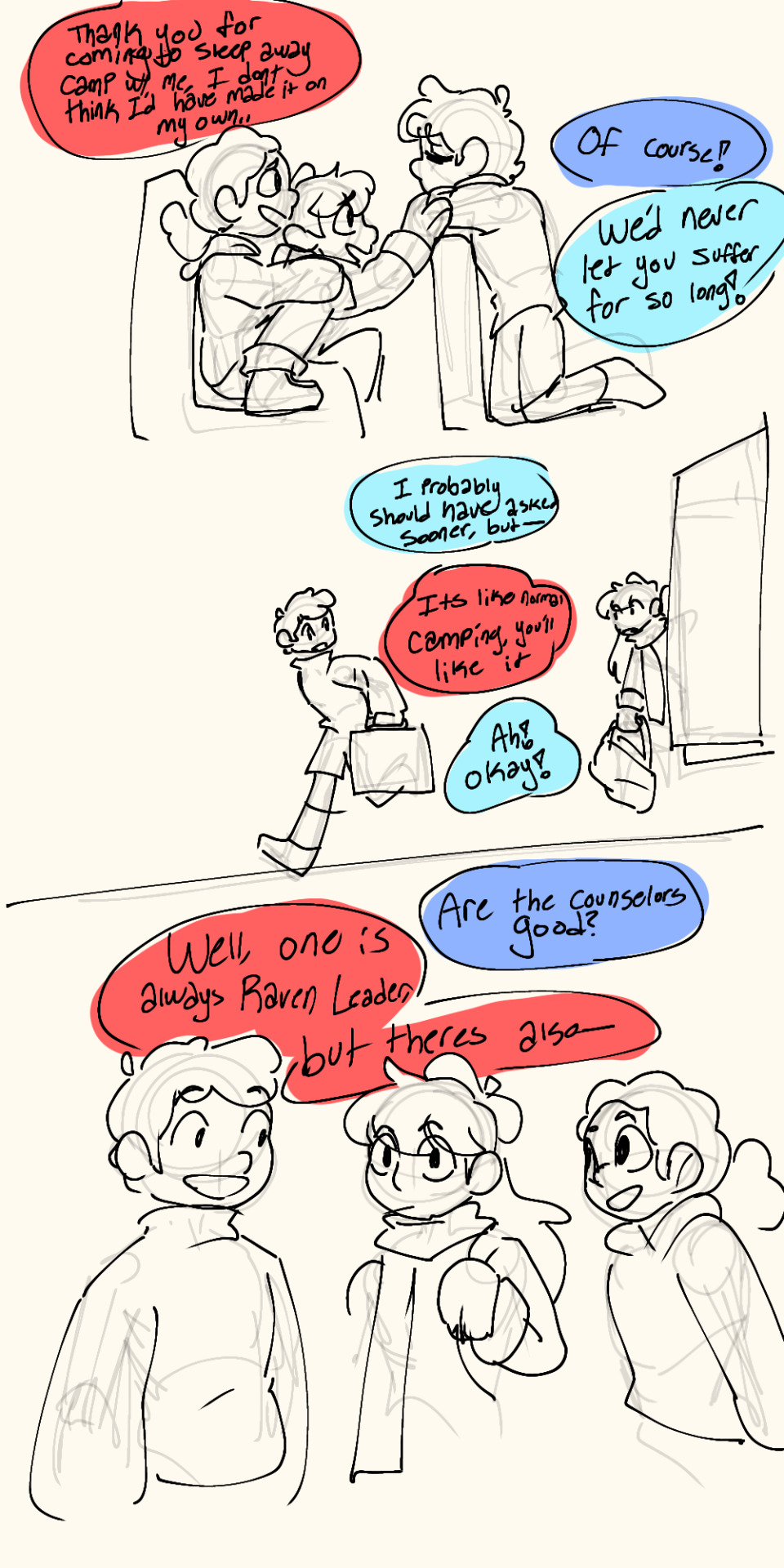
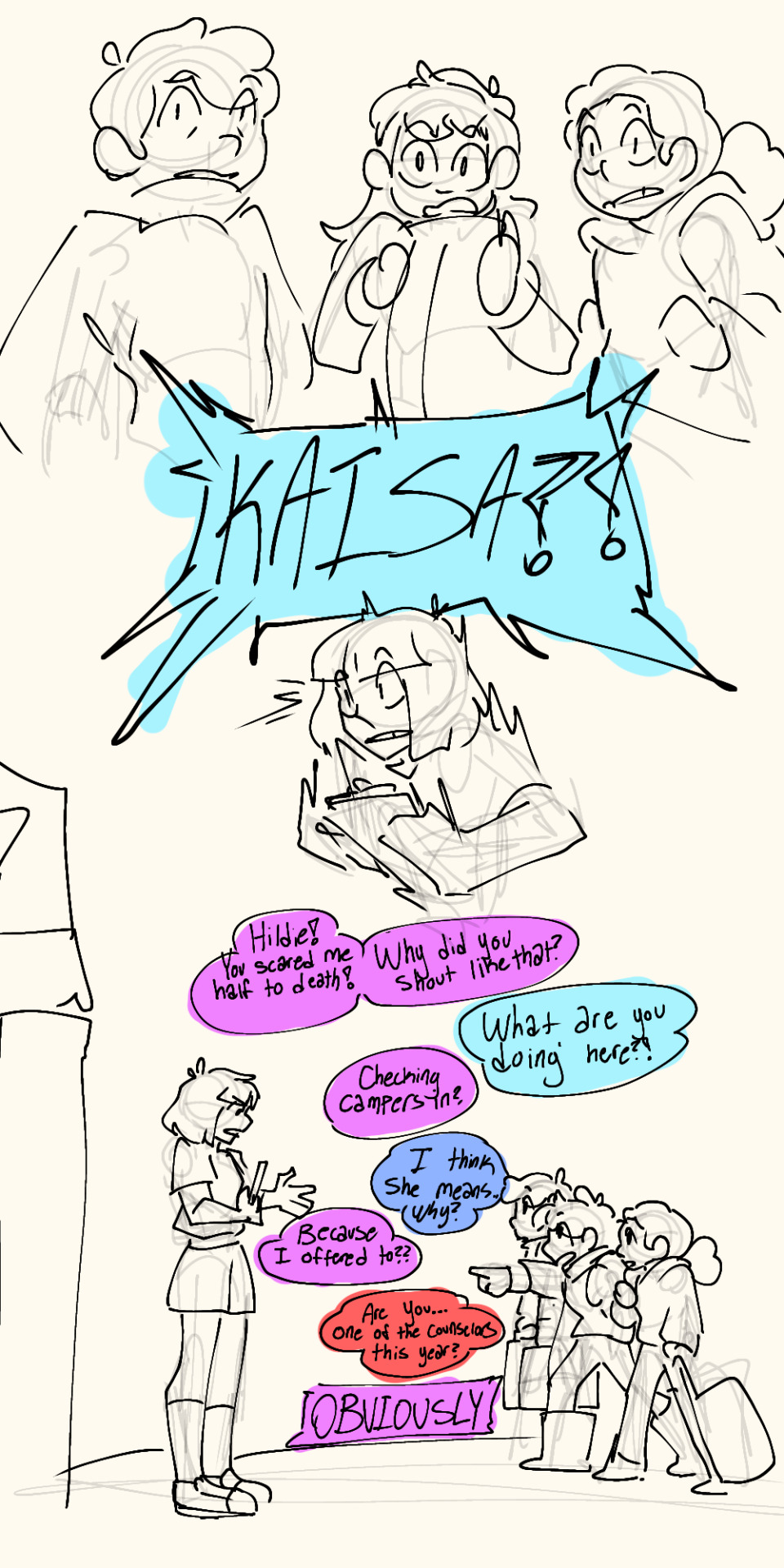
2 week summer sleep away camp
BUT KEEP HEARING ME OUT, BECAUSE
Pov:


You're being introduced to the camp counselors on the first day
#DO YOU GUYS SEE MY VISION#IVE LITERALLY BEEN THINKING ABOUT THIS FOR MORE THAN 12 HOURS NOW I HAVE SO MANY IDEAS AND PLANS#BUT I NEED TO KNOW EVERYONE ELSE IS WITH ME ON THIS IDEA BEFORE I DO MORE WITH IT#art#digital art#hilda netflix#hilda the series#hilda#frida hilda#hilda frida#david hilda#hilda david#kaisa hilda#hilda kaisa#kaisa the librarian#hilda librarian#raven leader hilda#hilda raven leader#erik ahlberg#erik hilda#hilda erik#ahlberg hilda#the bell keeper hilda#hilda bellkeeper#the bellkeeper hilda
410 notes
·
View notes
Text

Don't worry Kaisa, you'll get there with practice
#hilda#hilda the series#hilda netflix#hilda kaisa#hilda librarian#hilda johanna#kaisanna#sketchbook#sketchbook ship
194 notes
·
View notes
Text





funny animals.. these are my designs so far its so fun. twig is a little beetle. hilda is blue like how deerfoxes used to be!

bonus development cave paintings of twig and david:


#hilda the series#hilda netflix#johanna#kaisa#hilda the librarian#hilda frida#hilda david#the bellkeeper hilda#twig hilda#character design#redesign#hilda fanart#my art
424 notes
·
View notes
Text


They do this everyday, got the idea from @the-hilda-librarians-wife who said they fight like toddlers in the tags lol
@blaithnne
#kiki draws#hilda#hilda the show#hilda the series#hilda the librarian#hilda lauren#hilda librarian#Lauren hilda#kaisa hilda#hilda kaisa#hilda sketchbook
90 notes
·
View notes
Text


I wasn’t joking @jetcat-14
#hilda netflix#hilda the series#johanna hilda#kaisa hilda#kaisa the librarian#sketchbook ship#sketchbook#artwork#digital art#hilda season 3#art tip: if you don’t know how to colour#don’t#life’s too short for allat#making the source of light themselves is so fun though#jetcat I swear I’m not stalking you#it’s just all I see when I first open tumblr is something you’ve posted/reblogged#blame the system not me💀🙏
193 notes
·
View notes